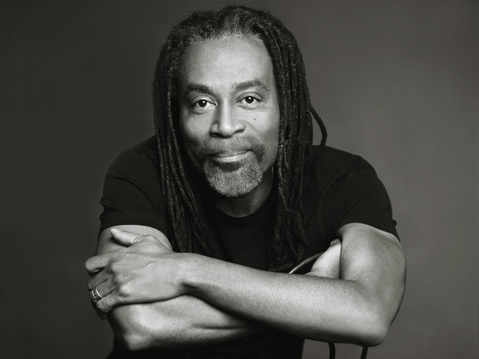Bobby McFerrin Coming to the Granada
UCSB’s Arts & Lectures Presents Bobby McFerrin

Thirty years and 14 albums ago, vocalist Bobby McFerrin burst onto the scene with a German tour of daring solo improvisations. While his name is instantly associated with the iconic pop song “Don’t Worry, Be Happy,” the 10-time Grammy winner is in reality a mercurial artist who has worked with jazz pianist Chick Corea, recorded duets with cellist Yo-Yo Ma, toured with the exploratory a cappella group Voicestra, advanced the beat-box vocal percussion movement, and sings the rolling arpeggios of Bach’s Prelude No. 1 in C Major unaccompanied. And did I mention he guest conducts major orchestras around the world?
On April 2, UCSB Arts & Lectures will bring McFerrin to the Granada Theatre, where he will be backed by a quintet of stellar instrumentalists on material from his new album, spirityouall. I recently had the opportunity to ask him a few questions.
I recall reading that in 1977, after listening to a lone trumpeter, you heard a voice telling you to be a singer. How metaphorical and/or mystical is that description? It was really a moment of epiphany. I’m pretty mystical about that kind of thing; I have no question about whether it was divinely inspired. When I think about it, there was a lot building toward that, but I really did have a moment of sudden knowledge. That doesn’t mean it didn’t take me years of work to learn how to do what I was hearing in my head.
You recently performed “My Audio Biography” with Jazz at Lincoln Center. What was it like to trace the thread from spirituals, through your father [operatic baritone Robert McFerrin Sr.], late ’60s jazz, ’70s funk, and into the present? It was really fun planning that program, thinking about all the songs that changed the way I heard music. Made me think of being a little kid conducting the stereo playing Beethoven’s Seventh, of playing keyboards for the tour of the Ice Capades and lying on the floor of my hotel room listening to Sly & The Family Stone, of seeing Miles with his electric band for the first time. All of those experiences changed who I was at a molecular level.
You have long shown a preference for wordless vocals. Are you now experiencing a renewed interest in lyrics? For years I felt like when I sang a wordless line the meaning was both more open for interpretation by the listener but also somehow even more deeply personal. This album has definitely helped me integrate that sense — of digging into the meaning with pure sound — back into singing a lyric, and really meaning it. These songs use a lot of repetition, so even when I’m singing the lyrics, I can use different approaches and weave a lot of strands together so it feels open. And these words mean a lot to me. The idea for spirityouall has been around for a long time, but it took shape slowly. I couldn’t sing these songs until I found my own way into them. I couldn’t sing them the way my father sang. He already did that better than I ever could.
Walt Whitman was often asked to recite his only conventionally structured poem, “O Captain! My Captain!” He came to despise it because it diverted attention away from the heart of his work. Have you have ever felt like that regarding “Don’t Worry, Be Happy”? This is great; I never heard that story. Years ago I felt pretty cranky about all the focus on that song. But I’m over it. I’m grateful. It’s amazing to me that it means so much to some people. And without it I wouldn’t have had the chance to reach such a wide audience, to realize so many of my dreams.
4•1•1
UCSB’s Arts & Lectures presents Bobby McFerrin at the Granada Theatre on Tuesday, April 2, at 8 p.m. For tickets and information, call (805) 893-3535 or visit artsandlectures.sa.ucsb.edu.



